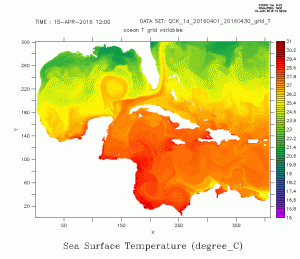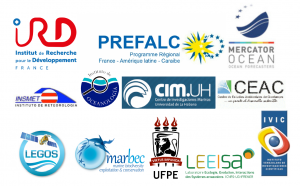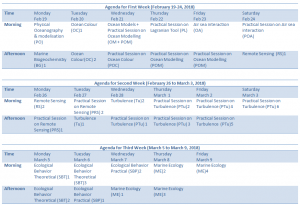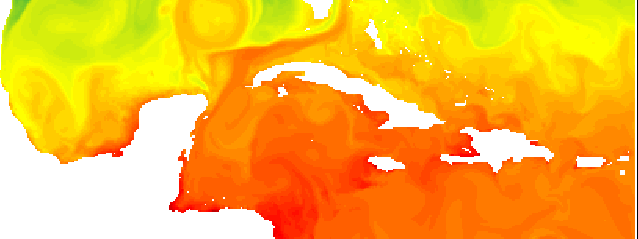
This winter, from February 19th, 2018 to March 9th, Mercator Ocean is co-organizing an oceanography winter school session in Havana, Cuba. The school will cover a variety of marine topics. Notably, it will be a chance to offer training on the new configuration of NEMO (Nucleus for European Modelling of the Ocean) made for the ocean surrounding Cuba. Also Copernicus Marine Service (CMEMS) ocean data products will be presented by Fabrice Hernandez, senior researcher at Mercator Ocean / IRD.
The session offers interdisciplinary trainings on the physical ocean, modelisation, biochemical state of ocean, ocean colour, remote sensing, ocean interaction with the atmosphere, and biological ecosystems. The lecturers come from a wide variety of disciplines and range from ocean physicists to atmosphericians, to biogeochemists, to biologists, to ecologists. It will cover an array of techniques such as modelisation, remote sensing including ocean colour, altimetry, and in-situ data. All will focus on one common topic, the marine systems–a prerequisite for successful interdisciplinarity. By bringing together researchers from disciplines that seldom interact, we aim to open up the space for innovative scientific questions and responses. We hope this training will help promote international cooperation in scientific research.
Courses will be given by: Ariane Koch-Larrouy (LEGOS-Mercator-Ocean/IRD, Toulouse), Guillaume Samson (Mercator-Ocean, Toulouse), Julien Paul (Mercator-Ocean, Toulouse), Vincent Vantrepotte (LEEISA, Guyana), Marcus Silva (UFPE, Recife, Brazil), Fabrice Hernandez (LEGOS-Mercator-Ocean/IRD, Toulouse), Arnaud Bertrand (MARBEC/IRD/UFPE/URFPE, Recife, Brazil), Sophie Bertrand (MARBEC/UFPE/IRD, Recife, Brazil)
The event is co-organized by Mercator Ocean and the following organizations:

For registration, please contact Ariane Koch-Larrouy at:
Detailed information on the Oceanography Winter School in Havana

Week 1
Physical oceanography and modelisation
General lectures about the forcing terms of the circulation and its main caracteristics will be tackled as well as general behaviors of models.
General lectures:
- PO – Ekman Circulation, Gyres, Thermohaline circulation, water masses formation, mixed layer, vertical mixing in the ocean (2x 3h, Ariane Koch-Larrouy)
Oceanic models (OM): (3h, Ariane Koch-Larrouy), discretization schemes, Stabbliity, convergence, sub grid parameterization, etc. - Practical session:
- POM – Practical on Ocean Modelling: realisation of a Cuban configuration with NEMO
- PL – Practical Lagrangian tool (ARIANE): to follow water masses (application for oil spill, larvae connectivity, etc.)
Marine biogeochemistry and Ocean Color
A general course will be delivered on the main biogeochemical cycles in marine waters (coastal and oceanic ecosystems). Following this course, there will be a specific session dedicated to using ocean color measurements for monitoring of the biogeochemical characteristics of marine environements. The main objectives will be to give general information on the main principles of ocean color, to provide to the students a panel of possible applications using this data, and to develop practical activities illustrating tools facilitating the use of ocean color data sets. In practice the main topics developed during this thematic courses will be:
General lectures
- BG1 – carbon cycle, global changes, acification, bloom, interaction with physic (3h, Vincent Vantrepotte)
- OC1 + OC2 – Ocean Color, and calibration of the data (2x3h, Vincent Vantrepotte)
General introduction: What is ocean color? (optical basic principles); optical sensor description, historical, main processing steps of ocean color processing; bio-optical inversion algorithm development such as specific issues related to coastal waters; data quality and validation; interest of ocean color data useful for studying the biogeochemical variability of coastal ecosystems, and examples of the possible applications in coastal waters; statistical approaches for exploiting ocean color archives.
Air-sea interaction and cyclones
- OA – Air sea interaction: from diurnal land sea breeze to interannual coupled variability, turbulent fluxes, Tropical Cyclones, oceanic processes related toTropical cyclones, impact of oceanic stratification (4 h G. Samson)
- POA – Analysis of the oceanic response to tropical cyclone in NEMO/WRF and observation (3h G. Samson)
Week 2/3
Remote Sensing: (Fabrice Hernandez)
- RS1 – Introduction to remote sensing and oceanography : The goal is to introduce the remote sensing observing system, provide an historical overview of its implementation since the 70’s, and detail some technical aspect of the sensors
and measurement concepts. - RS 2 –Remote sensing products over ocean for Sea Level, Sea Surface Temperature, Sea Surface Salinity, Ocean Colour, Sea Ice, Wave. The goal is to describe more precisely how SL, SST, SSS, OC, SeaIce parameters and Wave parameters are deduced from remote sensing (sometimes from multiple sensors), what are the strength and weaknesses of the different products.
- PRS1+2 – Practical on remote sensing data using CMEMS products
Turbulence lecturer invited from UFPE (Marcus Silva)
- Tu1+Tu2 – Turbulence in the ocean from observation to modelisation
- Practical Sessions:
- PTu1,2,3,4,5,6
Marine ecology: (Arnaud Bertrand )
Processes and scales in marine ecology: an integrated approach
- ME 1 + ME2 + ME3 + ME4 – Defining and choosing the spatiotemporal scales of study; Scale of study and processes; Scale of study and predator-prey relationships; Along-scale bottom-up ecosystem structuring.
Ecology behavior (Sophie Bertrand)
Ecology and behaviour of marine megafauna: questions, tools and statistical models. This lecture is organized into three main chapters: (1) megafauna relevance for ecosystem functioning, and key issues on the ecology, behaviour and conservation of those species; (2) modern tools for biologging: GPS, GLS, time depth recorders, accelerometers, etc.; (3) methods for the analysis and statistical modelling of the movements of these species (imputation, interpolation, regularisation, random walk modelling, segmentation methods, state space models, hidden Markov models. Part of the methods presented during the theoretical class will be applied to real data within R programming language. This lecture may be of interest for biologists, ecologists and applied statisticians.
- SBT1, 2, 3 – theoretical
- SBP 1, 2 – practical

